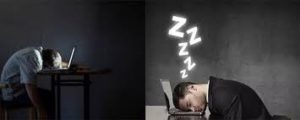Why Less Sleep and Oversleep Is Harmful To Your Health | Guest Post by Allison Staley

If you ever spent the night tossing and turning the bed, you’ll know how you will feel throughout the day- stressed out, tired, cranky and all sorts. But then, the detrimental effects of sleep deprivation go beyond leaving you dizzy throughout the day; it has a whole lot of long-term effects. And so does oversleep. Although, sleep is a good thing; getting too much of it could give you in a host of medical issues; ranging from diabetes to increased risk of death. One step at a time- let’s check out some effects of sleep deprivation before going on to see the effects of oversleeping.
Effects of Sleep Deprivation (Less Sleep)
Memory issues:
Do you know that remembering the name of an old colleague could fetch you perhaps some contracts? However, if you aren’t getting enough sleep- I mean 7-9 hours of sleep every night, you might be in for some serious problems with remembering things. During sleep, there is a transfer of information from short-term memory reservoir to long-term reservoir. It takes a deep sleep for this to happen; not just a 30-minute nap. For some, it is their mattress that hinders their sleep and if this is your situation, then you should try getting a hybrid mattress.
Weakened Immunity:
Germs are everywhere- that’s no news. However, everyone is born with some innate immunity. When we sleep, our immune system produces certain proteins called cytokines. Cytokines help us in fighting against germs. Cutting short your hours of sleep means signing up for decline in the production of these proteins and eventually, a weakened immune system. Of course, with a weakened immune system, your body is susceptible to the slightest pathogen that comes its way.
Increased blood pressure:
Another purpose of sleep is to relieve us of the stress we go through every day. Our sleep helps us in maintaining the level of stress hormones concentration in our system and generally improve the functioning of our nervous system. Over time, a lack of sleep could hurt your body’s ability to regulate the number of stress hormones in your system leading to an increased risk of high blood pressure.
Lower sex drive:
A recent study shows that men with poor sleep patterns have low levels of testosterone, which results in a lack of sex drive. Indeed, the benefits of getting adequate sleep consistently cannot be overemphasized.
Effects of Oversleeping
We often hear of the dangers of sleep deprivation and how harmful it is to our health. However, going to the extreme by oversleeping (sleeping for more than 9 hours at a stretch) could also pose some unseen long-term damages to your health. Some include:
Depression:
Oversleeping gradually leads to a decline in your overall mental health and eventually, depression. There are facts! At least 15% of people with depressive symptoms have a habit of oversleeping. Again, a recent twin study showed that sleeping either too little or too much leads to an increase in the genetic heritability of depressive symptoms. In other words, when you sleep for up to 10 hours at a stretch, you shoot yourself in the leg.
Increased weight gain:
Every single one of us has a dream body shape; shot out muscles with a broad chest for the guys, and an hour-glass shape for the ladies. Yet, if you don’t get over your habit of excessive sleeping, your dream body shape would be unachievable. Let me explain the science to you: when you sleep, you spend less amount of energy compared to when you are awake. You know the rule of thumb: spend less energy, burn less food. If you are the type that eats a lot, you can be sure your food is being converted to fats since you sleep a lot instead of burning the energy derived from food.
Wrapping Up
It’s up to you to find the balance between oversleeping and under-sleeping. Attaining this balance implies you can enjoy all the benefits of sleep.

